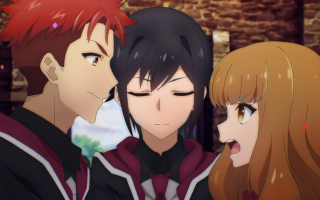In the afterword of Our Dating Story: The Experienced You and The Inexperienced Me‘s first volume, author Makiko Nagaoka remarked: “If I got lucky enough to date a beautiful voice actress I admired, would I give up on the idea if I found out she wasn’t a virgin? There’s no way I would…”
She has a point. Statistically speaking, you’d be awfully presumptuous if you demand your partner to have no sexual or romantic experience before meeting you. Less than 2% of people marry their first love, and the average person has at least two long-term relationships before meeting the person they marry.
But high school anime romcoms operate under a different logic from reality. One could say that the genre exists to paint an idealised, nostalgic picture of young love. And because this usually involves a coming-of-age theme, the stories are almost exclusively about characters entering their first serious relationship. They are often explicitly shown marrying the first person they ever date.
Pictured: The Quintessential Quintuplets
The thing about sticking to formulaic narrative structures is that you can also end up being constrained by the social values of an older era. If you’re writing a teen love story, then the characters’ virginity is suddenly very important. If they are not virgins, then logic would disqualify them from experiencing “true” love. The gender double standard also factors into this to some degree. In romcoms targeted at male audiences, female characters with sexual experience are usually not considered primary love interest material. You might see a MILF or a seductive older woman as a side contender, but a teen girl who isn’t a virgin? How scandalous.
Our Dating Story: The Experienced You and The Inexperienced Me stands out by revealing in its first episode that the heroine is not a virgin—and then going on to depict a very conventional, puppy-love sort of romance anyway, as if to say “Who cares about that noise?” For all of her past relationship experience, Runa Shirakawa is a very cute and innocent girl at heart. It becomes very clear early on that sexual experience is not the same thing as experience in love.
If I have to be perfectly honest, I’m not really that into the relationship between the timid nice guy Ryuto Kashima and the gyaru Runa Shirakawa. It’s the kind of romance where the characters spend a lot of time gushing about what they like about each other, which is cute and all, but doesn’t make for much onscreen chemistry. But the story does take its time to have the male protagonist verbally reassure Shirakawa that her previous experiences does not diminish their current relationship, nor do they diminish her as a person.
It’s also refreshing to see the characters engage in frank conversations about sexual consent. After Shirakawa reveals in episode one that she had sex with her exes because she felt “obliged” to, Ryuto tells her that she should only do it if she really wants to. This plot point comes up again later in episode five, when Shirakawa becomes silently worried about whether she “led” Ryuto on when she casually touched him in their hotel room together. He reiterates that the decision to initiate sex is completely hers, implicitly assuring her that he’s not going to interpret other forms of intimacy as sexual consent. I have to respect Ryuto for being a genuinely nice person in a situation where plenty of other individuals would not be nice.
With such a solid relationship based on trust, you’d think that these two would be immune to the usual miscommunication-based conflicts that happen in romcoms, right? Well, no. The climax of the anime is about Shirakawa assuming that Ryuto would be better off with her sister, because she was his first crush. As frustrating as this storyline is, I can’t help but think that her behaviour stems from her idolising Ryuto too much and assuming she’s unworthy of him. In her mind, he’s the first boyfriend to treat her so kindly—he must deserve more in return. So I don’t believe that it’s too outlandish that their relationship takes a negative turn soon after they tell each other earnestly how they feel.
What’s particularly interesting about Shirakawa as a character is how she admires that her parents were junior high school sweethearts. That was her reason for agreeing to everything her first boyfriend asked—even though her parents ended up divorcing down the line. And, of course, Ryuto’s first crush didn’t work out either, nor does he have any interest in reigniting that relationship after falling for Shirakawa. One could say that Shirakawa’s mental hang-ups fundamentally stem from her obsession with “first love”, and that to fully embrace her current relationship, she must move past that mindset.
I think that this is the story’s gentle way of reminding us that we shouldn’t put “virginity” and “first love” on a pedestal. Regardless of what experiences you’ve had in your life, falling in love with the right person exposes you to many “first times”. It’s not the other way around.
That might seem like such a self-evident point that you’d wonder why someone would bother writing a whole book series about it, but I do feel that it’s a meaningful theme for the genre and target audience. Our Dating Story: The Experienced You and The Inexperienced Me might not be the most creative or exciting romcom anime out there (even just this season, it’s hard to compete against 100 Girlfriends), but I definitely think it deserves credit for challenging the slut-shaming that sometimes seems implicit in the genre. A sexually experienced girl can be a cute anime heroine too, just you watch!
(Nicole is the best girl, though.)



